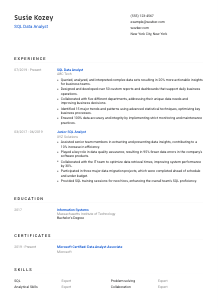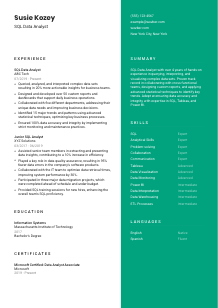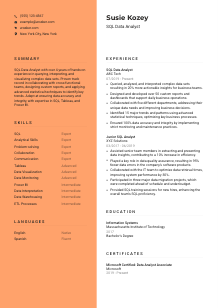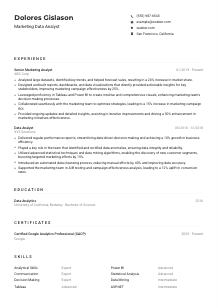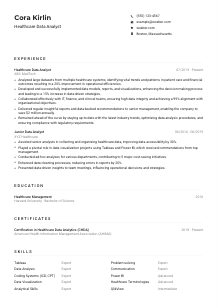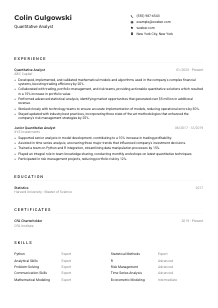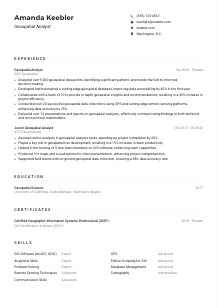SQL Data Analyst Resume Example
Querying datasets, but your resume doesn't fetch results? Browse this SQL Data Analyst resume example, refined with Wozber free resume builder. Understand how to thread your data-driven insights with job requirements, making your career trajectory as optimized as your SQL queries!
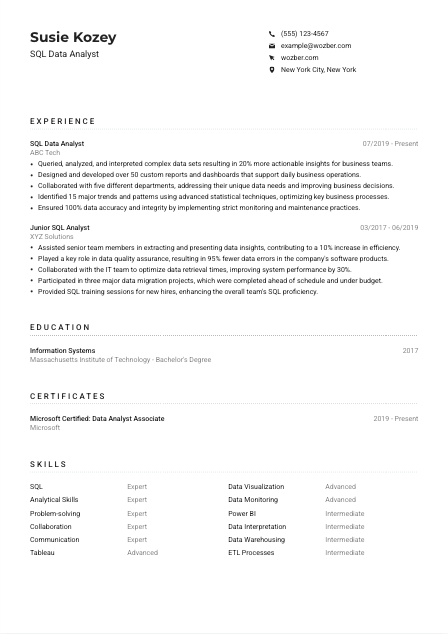
How to write a SQL Data Analyst resume?
Greetings, aspiring SQL Data Analyst! In an environment where the competition for your dream job is fierce, having a resume that not only speaks to your qualifications but also resonates with recruiters is essential. Your resume is more than a document; it's a compelling story of your career journey, tailored to the role you're aiming for. Dive into crafting a resume with precision and creativity, optimally leveraging the power of Wozber's free resume builder, ATS-friendly resume template, and extensive ATS optimization tools.
Ready to shine a spotlight on your prowess and land that SQL Data Analyst position? Let's get started!
Personal Details
The Personal Details section is your resume's handshake, making a strong first impression. Especially for a SQL Data Analyst, this section should not only mirror professionalism but also subtly reflect your alignment with the technical nuances of the role. Let's walk through sculpting this pivotal section.
1. Name as Your Brand
Your name is your headline. Ensure it's prominently placed with a clear, professional font. This is the first step in making your resume memorable.
2. Job Title Precision
Position yourself precisely for the role by stating "SQL Data Analyst" right below your name. This immediate alignment with the job title sets a focused tone for your resume.
3. Essential Contact Details
Include only critical contact information: your phone number and a professional email. Remember, firstname.lastname@email.com speaks volumes more professionally than quirky handles.
4. Geographic Suitability
For a SQL Data Analyst role that values locality, like the New York City requirement in our job description, clearly indicating your matching location is crucial. It assures recruiters of your availability and fit.
5. Online Professional Presence
Including a LinkedIn profile or personal website showcases your professional dimension online. With roles as dynamic as SQL Data Analyst, demonstrating an active professional presence can be a game-changer.
Takeaway
This section, though brief, establishes the foundation of your professional presentation. Make each word count, aligning tightly with the SQL Data Analyst role's specificity. It's your first opportunity to stand out - capitalize on it!





Experience
The experience section is where you wield your professional narrative. Here, a meticulously crafted showcase, tailored to highlight your SQL Data Analyst expertise, takes center stage.
- Queried, analyzed, and interpreted complex data sets resulting in 20% more actionable insights for business teams.
- Designed and developed over 50 custom reports and dashboards that support daily business operations.
- Collaborated with five different departments, addressing their unique data needs and improving business decisions.
- Identified 15 major trends and patterns using advanced statistical techniques, optimizing key business processes.
- Ensured 100% data accuracy and integrity by implementing strict monitoring and maintenance practices.
- Assisted senior team members in extracting and presenting data insights, contributing to a 10% increase in efficiency.
- Played a key role in data quality assurance, resulting in 95% fewer data errors in the company's software products.
- Collaborated with the IT team to optimize data retrieval times, improving system performance by 30%.
- Participated in three major data migration projects, which were completed ahead of schedule and under budget.
- Provided SQL training sessions for new hires, enhancing the overall team's SQL proficiency.
1. Dissect the Job Requirements
Begin by dissecting the "Responsibilities" and "Requirements" from the job description. For SQL Data Analyst roles, focus on SQL expertise, data visualization skills, and analytical prowess.
2. Chronology of Success
List your experiences in reverse chronological order. Start with your current or most recent SQL Data Analyst role, underscoring your progression and growth in the field.
3. Tailored Achievements
Highlight achievements that directly mirror the job description. If you've "Designed and developed custom reports," make it known. This demonstrates a direct alignment with pivotal role requirements.
4. Quantify Success
Whenever possible, quantify your achievements. Statements like "resulting in 20% more actionable insights" offer tangible evidence of your impact, making your contributions stand out.
5. Relevance is Key
Keep it relevant. While it's tempting to list all accomplishments, prioritize those that directly speak to the skills and experiences sought for the SQL Data Analyst role. Laser focus trumps breadth.
Takeaway
Aligning your experience with the SQL Data Analyst position involves deliberate selection and presentation of your professional journey. Employ precision in showcasing relevant, quantifiable achievements that resonate with the role's demands. Let your experience do the talking, making it impossible for recruiters to overlook your candidacy.
Education
Your educational background is more than a formality; it's a testament to your foundational knowledge. For SQL Data Analyst roles, this means not just any degree, but the right one, coupled with relevant technical proficiencies.
1. Degree Specifics
Firstly, make sure your degree aligns with the job's requirement. For instance, a "Bachelor's Degree in Computer Science or related field" directly satisfies a primary qualification for our SQL Data Analyst position.
2. Conciseness is Clarity
Maintain clarity by structuring your education details succinctly: degree, field of study, institution, and graduation date. This straightforward format aids in quick comprehension.
3. Degree Alignment
For jobs like SQL Data Analyst, where specific knowledge bases are critical, ensure your education section showcases your relevant degree. Tailor your field of study as precisely as possible to the job requirement.
4. Coursework and Projects
While not always necessary, listing relevant coursework or projects can be beneficial, especially if they directly relate to SQL data analysis. This can provide a deeper insight into your expertise.
5. Additional Accolades
Should you have accolades like honors or significant projects that underscore your competency in data analysis, do mention them. This elevates your profile, illustrating a commitment to excellence in your field.
Takeaway
While the education section might appear straightforward, it's vital in underscoring your readiness for the SQL Data Analyst role. Tailor it to illuminate your relevant academic achievements and specialized knowledge. Let this section affirm your educational backbone, aligning seamlessly with the role's prerequisites.
Certificates
In the ever-evolving field of data analysis, certifications can dramatically bolster your profile. They serve as concrete evidence of your skills and ongoing dedication to professional growth, especially in niche areas like SQL.
1. Distinguish Relevant Certifications
Opt for certifications that enhance your candidacy for the SQL Data Analyst role. The "Microsoft Certified: Data Analyst Associate" certification, for example, marries perfectly with the job's skill demands.
2. Be Selectively Comprehensive
While it's tempting to list every certification, focus on those most relevant to SQL data analysis. This precision ensures your profile resonates more strongly with the specific demands of the role.
3. Period of Validity Matters
When applicable, note the acquisition or expiration dates of your certifications. This highlights recency and relevance, especially in a fast-changing field like SQL data analysis.
4. Continuous Learning
The tech landscape is dynamic, and the same goes for SQL data analysis. Seek out new learning opportunities, ensuring your toolkit remains razor-sharp and your certifications up to date.
Takeaway
Certifications are not just accolades but affirmations of your professional evolution and specialization. Especially for SQL Data Analyst roles, they underscore your commitment and proficiency. Choose wisely, prioritize relevance, and let your certifications echo your expertise loudly.
Skills
Your skills section is a powerful showcase of your capability arsenal. For a SQL Data Analyst, this means a harmonious mix of technical prowess and soft skills, all aligned to meet and exceed the job's requirements.
1. Decipher the Job's Needs
Start by decoding the job description for both explicit and implicit skills needed for the SQL Data Analyst position. Skills like "SQL," "data visualization," and "analytical skills" are your targets.
2. Match and Mention
Counterpoint your skills against the requirements. For instance, proficiency in "SQL" and familiarity with "Tableau" or "Power BI" should be highlighted to directly address the needs of the role.
3. Structured and Streamlined
Keep your skills section focused and organized. Prioritize the listing of your skills to mirror the importance and relevance to the SQL Data Analyst role, ensuring immediate impact on the recruiter.
Takeaway
Approach the skills section as your platform to convincingly argue your fit for the SQL Data Analyst position. By carefully matching and articulating your skills with the job requirements, you compel the recruiter to see you as the ideal candidate. Be deliberate, be proud, and let your skills pave the way.
Languages
In today's interconnected world, your ability to communicate in multiple languages can be a substantial asset, especially when the role involves dealing with diverse data sets or collaborating across global teams as a SQL Data Analyst.
1. Job Description Review
First off, check if the job specification highlights any particular language requirements. For the SQL Data Analyst role, "Ability to effectively articulate in English required" is a direct ask.
2. Prioritize Primary Language
If the job specifies a language, like English in our example, ensure it's listed prominently with your proficiency level clear and unmistakable.
3. Showcase Linguistic Diversity
Secondary languages, while not always explicitly required, can be a bonus, demonstrating your versatility and potential for wider communication.
4. Honesty in Proficiency
It's crucial to accurately represent your language skills. Over or underestimating your proficiency can lead to miscommunications down the line.
5. Role's Scope and Languages
Consider the broader context of the role. If it involves international data or cross-border teams, highlighting your multilingual capabilities might give you an edge.
Takeaway
Your command over languages speaks volumes about your ability to engage with diverse datasets and teams. For SQL Data Analyst positions with a global or multicultural focus, showcasing your language proficiency can be a distinguishing advantage.
Summary
The summary section is your chance to encapsulate your candidacy into an impactful narrative. For a SQL Data Analyst, this means highlighting your analytical acumen and technical skills upfront.
1. Digest the Role
Begin by thoroughly understanding the SQL Data Analyst role, zeroing in on the main competencies and experiences sought.
2. Introduce Your Expertise
Open your summary with a strong statement that defines you as a professional. For instance, "SQL Data Analyst with over 4 years of hands-on experience in querying, interpreting, and visualizing complex data sets."
3. Mirror Contributions and Skills
Tactfully weave in your contributions and skills that address the job requirements. Demonstrations of your impact, like "Designed and developed over 50 custom reports and dashboards," prove your value.
4. Compact and Powerful
Keep your summary tight and potent. Aim for 3-5 impactful lines that invite the recruiter to delve deeper into your resume, intrigued to learn more about your SQL Data Analyst journey.
Takeaway
Treat your summary as your moment to shine, a succinct pitch that cements your standing as the ideal candidate for the SQL Data Analyst role. With precision, highlight your unbeatable blend of skills and experiences, compelling the recruiter to recognize your potential impact.
Launching Your SQL Data Analyst Journey
The path to securing your desired SQL Data Analyst position is now demystified. With these insights, powered by Wozber's ATS-compliant resume, ATS-friendly resume template, and ATS optimization tools, you're equipped to craft a resume that not only meets but exceeds expectations. Your career narrative is unique; let it guide you to tailor a resume that opens doors to new opportunities.
The stage is set for your brilliance. Unleash your potential and take the next step in your SQL Data Analyst career.

- Bachelor's Degree in Computer Science, Information Systems, or a related field.
- Minimum of 3 years' experience in SQL data analysis or a related field.
- Proficiency in SQL and data visualization tools such as Tableau or Power BI.
- Strong analytical and problem-solving skills, with attention to detail.
- Excellent communication and collaboration abilities to work in cross-functional teams.
- Ability to effectively articulate in English required.
- Must be located in New York City, New York.
- Query, analyze, and interpret complex data sets to provide actionable insights.
- Design and develop custom reports and dashboards to support business operations.
- Collaborate with different departments to understand their data needs and provide guidance on data structure and best practices.
- Identify trends and patterns using statistical techniques to improve business decisions.
- Ensure data accuracy, integrity, and consistency by monitoring and maintaining databases.





